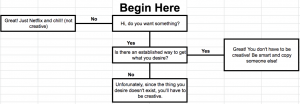Hi, I’d like to talk,
I don’t think creativity can be a goal.
I really don’t think children can be made more creative (because they’re already 100% creative).
And I don’t take creativity to be a compliment.
Why shouldn’t people want to be more creative? Isn’t creativity… good? Isn’t it good to be good? Why shouldn’t we be trying to make our children more creative? And why isn’t it a compliment to tell someone they’re creative? I’ll admit, it does sound weird when you put it all together, but that’s why I’m here. This essay is the first in a three-part series. Let’s go.
Creativity isn’t a Goal
Some things can only be achieved as the side effects of other pursuits. Happiness is a good example. Trying to feel happy probably won’t make you feel happy. You need to accomplish a task and exhale. Then you might feel happiness as a side effect.
Creativity is a little like happiness, but easier to verify. Creativity creates things. And those things prove that creativity occurred. Creativity’s creations are also receipts. I’m being creative right now and I have this essay to prove it. Happiness doesn’t produce essays, it’s how I hope I feel when I’m done.
Creativity bleeds, happiness agrees.
There is a three-word answer to how do I become more creative? But in order to understand the answer, it’s important to understand why it’s such a poor question.
I think creativity hired a great publicist. Creativity has a much better reputation than it deserves. Everyone wants to be on the creative team. But the truth is, most of the time you won’t have to use creativity to get what you want. Here’s a chart.

It’s usually so much easier and more efficient not to use creativity to get what you want. Want to get better at pool? The best way is to not be creative. Read the best book on how to do it and apply discipline. Want to build your first bridge? Please, do not be creative; copy classical architecture. Starting a new skill is a great example of when creativity will not serve those who use it.
Creativity is generally associated with the arts because, for example, there are plenty of books to read, but if you want to write one of your own, you’ll have to be at least a little creative. You can go to a museum to look at any number of masterpieces, but if you want to paint your own, you’ll have to be creative. I think this is why creativity is generally associated with art, although if you think about it, creativity should be equally distributed everywhere. Everything, after all, has been created.
I’m here to say this:
Creativity is not king, desire is. Desire tells creativity what to do, not the other way around. But most people think creativity wears the crown. The truth is, without desire, creativity would not exist.
When desire needs something, creativity is his last resort. Desire would much rather summon reliable servants like discipline, routine, or buying things with cash. Desire finds creativity to be incredibly unreliable. If something is creative, it means it’s nothing like anything that has existed before. That’s probably a bad thing. And on the off chance that creativity produces something great, desire usually prefers the familiar, however mediocre, to the innovative.
Desire Efficient Things
Someone on Earth is best at nailing nails with a hammer. That person doesn’t know they’re the best and they don’t care. They just love to build. The skill with the hammer is a happy side effect of their desire to build.
Someone on Earth is the most creative person. I don’t think they know it either and I don’t think they care, because that person’s desire is solely focused on something only they can see. I don’t know if that is a blessing or a curse.
Reading a book or essay on creativity is the last way to find it.
How do I become more creative? What’s the three-word answer? Pursue something else.
So, what do you desire?
Why do I really not like it when people try to make children more creative? And why do I not take “creative” to be a compliment? Those are parts two and three, coming soon.